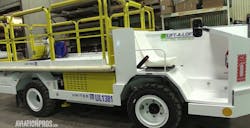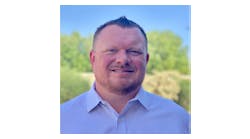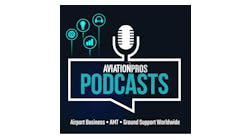With most of the nation's airports taking a wait-and-see approach to the Transportation Security Administration's (TSA) "Opt Out" security screening program, at least two regional airports are jumping at it. One airport has received the go-ahead, while a second is awaiting a decision from TSA.
TSA has accepted Sioux Falls Regional Airport's application to participate in the so-called Screening Partnership Program. The South Dakota airport now will be able to opt out of using federal TSA officers to handle passenger and baggage screening and instead use a private company for these services (RAN, Aug. 1).
To date, most airports have been reluctant to dive into the program because of liability fears -- that airports, and not the federal government or the private security firms, might be liable for damages resulting from security breaches -- but also because they think they would have little say in which private security firms would replace the federal screeners.
On July 27, TSA approved 34 private companies on a "qualified vendor list" (QVL) to handle passenger and baggage screening services at the airports in the screening program. With the addition of Sioux Falls Regional, there are now seven airports in the program. While Sioux Falls is the only regional airport, Elko Regional Airport in Nevada previously expressed an interest in applying to opt out of the federal screener program. Elko's application is still pending.
Sioux Falls Regional was the first airport that TSA accepted into the program since the agency selected five large airports to participate in a pilot program to test the use of private screening firms.
TSA opened up the program to airports outside of the pilot program last fall. While several airports have indicated they are holding back their applications because they want a larger role in selecting and monitoring the private firms that provide the screening services, this apparently was not a worry for Sioux Falls. Sioux Falls also is under the impression it will not have any liability issues.
But the concerns of the airports that have chosen not to take the plunge have weighed on the program, and these worries became the focus of a July 29 hearing in Congress.
Witnesses and some legislators at the hearing agreed that checkpoint management, especially in terms of hiring and staff deployment, would be more efficient if most decisions were made locally. That could mean devolving the decision-making power from TSA's Washington headquarters to either its regional federal security directors or to local airport management.
Prior to the terrorist attacks of Sept. 11, 2001, before TSA was born, airports used private firms to manage passenger and bag screening operations, and the Federal Aviation Administration (FAA) was responsible for standard- setting and oversight. Today, TSA would supervise the use of private firms much the way the FAA used to.
When Opt Out was in the formative stages of development, airport officials thought that they would at least get to choose the private firms that would work in their facilities, Bob Poole, founder of president of the Reason Foundation, told the House Homeland Security Subcommittee on Economic Security, Infrastructure Protection, and Cybersecurity.
But this is not the way things turned have out. In Opt Out, TSA not only selects the firms that will be on the QVL, it selects the firms for each airport. That is, after an airport is accepted for the program, TSA contracts with a firm off of the QVL to provide screening services at that airport.
One problem with this arrangement, and TSA's mission generally, is the conflict of interest inherent in the agency's competing roles as direct service provider and as the federal agency with congressionally designated oversight for airport security, Poole said. This was also true for FAA when it oversaw airport screening. TSA would be better off if it focused on policy development and oversight, and let airports have a larger role in daily security operations, he added.
Agreeing that screening decision-making authority should be decentralized, James Bennett, CEO for the Metropolitan Washington Airports Authority, told the committee that TSA's "rigid personnel policies" are a big reason why the agency still has a high turnover rate. Bennett was also representing the Airport Legislative Alliance and the two main U.S. airport trade groups, Airports Council International-North America and the American Association of Airport Executives.
TSA Acting Deputy Administrator Thomas Blank admitted that the national screener attrition rate has been about 24 percent annually over the last two years. But that compares favorably to the more than 100 percent annual turnover rate just before 9/11.
John DeMell, president of one of the first firms on the QVL, FirstLine Transportation Security, which is managing screening operations at Kansas City International Airport, said his firm has gotten attrition down to about 1 or 2 percent.
Rep. Dan Lungren (R-Calif.), chairman of the subcommittee, said he sympathizes with the airports. TSA's "rigid, centralized control gives little weight to airport diversity," he said.
At T.F. Green Airport in Providence, R.I., the lack of localized decision-making authority forces the airport's federal security director to "do the dance," said Mark Brewer, CEO of the Rhode Island Airport Corp., which overseas Providence and several other smaller Rhode Island airports. The "dance" is what happens under the TSA-imposed screener cap for the airport, when screening personnel must be quickly shuffled to keep the checkpoint lines down. The only way to make this work is through mandatory overtime, Brewer emphasized.
At least T.F. Green is now lucky enough to be part of a TSA pilot program in which TSA's security director is allowed greater input in selecting job applicants to hire as screeners, Brewer added.
For his part, TSA's Blank did not deny that managing the screener workforce from Washington has been a challenge. To increase its responsiveness to local conditions, the agency has been emphasizing the use of part-time workers or workers who are willing to "job-share" the same 80-hour full-time equivalent position. Under Opt Out, in fact, Blank said TSA wants to explore sharing screeners with airport authorities, who can assign the same workers to other jobs when the volume at the checkpoints eases up.
The only legislator at the hearing who came out against using private firms was ranking member Bennie Thompson (D-Mass.), who also recognized that TSA has been struggling to efficiently manage the screener workforce. ?
<
<< Copyright ©2005 Access Intelligence, LLC. All rights reserved. >>




